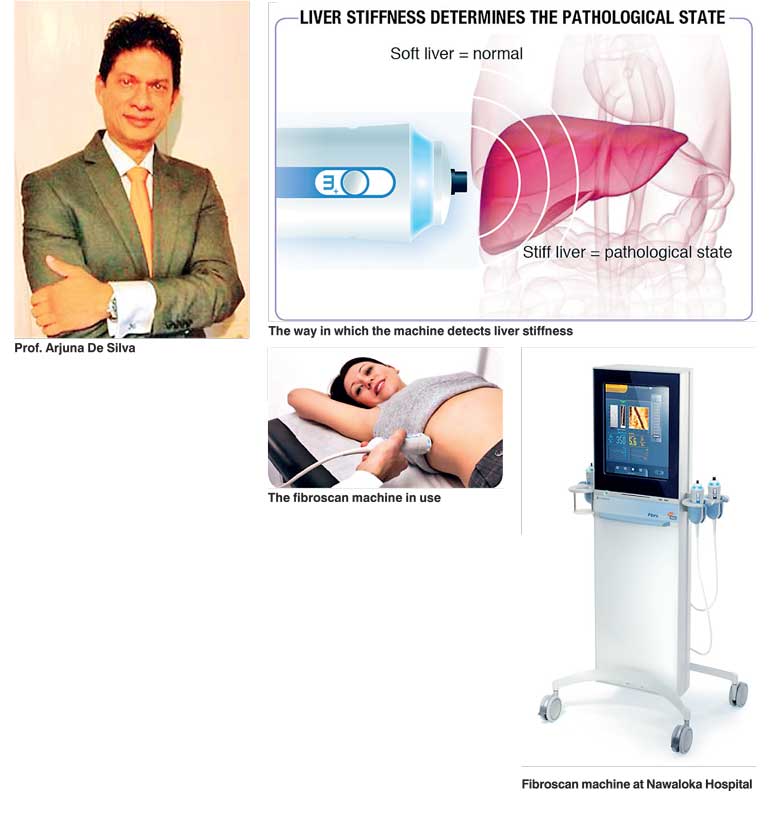Saturday Feb 28, 2026
Saturday Feb 28, 2026
Wednesday, 16 March 2016 00:00 - - {{hitsCtrl.values.hits}}

Today liver disease is rising in Sri Lanka at an alarming rate, and is the second most common cause of hospital deaths after heart disease. For decades now, patients have had little choice but to take recourse to the invasive liver biopsy method or an ultrasound scan to gauge the extent of damage to their liver.
Considering the plight of liver patients and in keeping with its reputation of pioneering the latest medical technology to Sri Lanka, Nawaloka Hospital has now installed the advanced fibroscan machine, which offers a painless and non-invasive alternative to liver biopsy or other less accurate methods.
Prof. Arjuna De Silva, MBBS, MD, MRCP (UK), MSc (Oxon), FRCP (Lond), FCCP – Head of Medicine, University of Kelaniya, commends Nawaloka Hospital’s initiative to install the fibroscan machine, saying: “The fibroscan machine boasts highly advanced technology which enables doctors to view instantaneous results and begin treatment of patients without allowing a fibrosis to develop into cirrhosis. Another advantage of this technology is that by doing the scan, liver cirrhosis can be caught at an early stage with greater chances of reversal and recovery.
“For patients, the fibroscan machine is a heaven-sent, because now they do not have to undergo the invasive and often painful liver biopsy method which, though effective, requires the patients to be admitted in hospital. The fibroscan takes no longer than a few minutes. I believe Nawaloka Hospital’s fibroscan machine will revolutionise the treatment of liver disease in the country.”
Fatty liver is a rising occurrence amongst Sri Lankans today. The liver is the second largest organ in the body and its function is to process everything we eat or drink and filter any harmful substances from the blood. This process is interrupted if too much fat is stored in the liver, causing fatty liver. Up to 35% of adults in urban Sri Lanka suffer from fatty liver. Fatty liver can progress from simple fatty liver to cirrhosis eventually and this process could take about 20 years.
But the good news is that if fatty liver is caught early, it is possible to reverse the damage and this is where the fibroscan takes centre-stage, as it can be used as part of an annual health check if the patient leads an unhealthy lifestyle.
“The non-alcoholic version of the fatty liver is caused by fast food, lack of exercise, obesity and diabetes. Some of the tests used to detect fatty liver are an ultrasound scan or a liver function test. However, while an ultra sound scan diagnoses fatty liver, it does not detect cirrhosis, which is a more advanced and possibly fatal stage of fatty liver. The fibroscan however gives a precise report on the extent of damage and all other relevant medical information for the doctors to commence treatment post-haste,” says Prof. De Silva.
Nawaloka Hospital is now offering the fibroscan as part of the healthy liver package, where patients can check up on their liver just as they do checkups for heart disease etc. People who consume alcohol or those who are obese are at a greater risk of contracting alcoholic fatty liver disease. The fibroscan helps the doctors to track the progress of fatty liver disease and shows accurately whether the treatment is reversing the disease or not. The fibroscan is also a vital tool to monitor the health of youngsters who consume excessive whey protein for building muscle, as it is known to damage the liver.
The fibroscan test is conducted as a short out-patient procedure without any after-effects. Moreover, the test, which takes only five to seven minutes to perform, costs less than the liver biopsy and is conducted without sedation and hospitalisation.
Prof. De Silva comments: “The fibroscan has multiple benefits for patients in prevention and treatment of fatty liver and its more advanced stages. Nawaloka offers a centre of excellence – The Nawaloka Liver Center – which boasts of professionals trained in advanced liver disease management. The fibroscan machine has now empowered the team even further and propelled Nawaloka to the forefront of revolutionising liver disease management in Sri Lanka.”